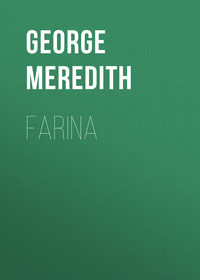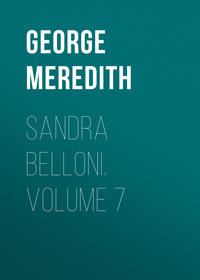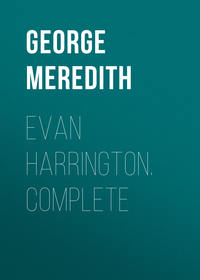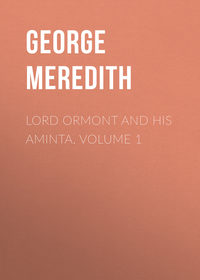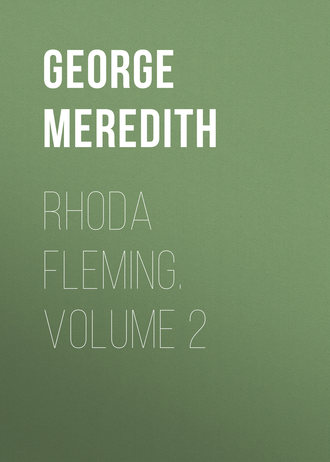
Rhoda Fleming. Volume 2
The farmer replied: "Mother, let's have no woman's nonsense. What we've got to bear, let us bear. And you go on your knees to the Lord, and don't be a heathen woman, I say. Get up. There's a Bible in your bedroom. Find you out comfort in that."
"No, William, no!" she sobbed, still kneeling: "there ain't a dose o' comfort there when poor souls is in the dark, and haven't got patience for passages. And me and my Bible!—how can I read it, and not know my ailing, and a'stract one good word, William? It'll seem only the devil's shootin' black lightnings across the page, as poor blessed granny used to say, and she believed witches could do it to you in her time, when they was evil-minded. No! To-night I look on the binding of the Holy Book, and I don't, and I won't, I sha' n't open it."
This violent end to her petition was wrought by the farmer grasping her arm to bring her to her feet.
"Go to bed, mother."
"I shan't open it," she repeated, defiantly. "And it ain't," she gathered up her comfortable fat person to assist the words "it ain't good—no, not the best pious ones—I shall, and will say it! as is al'ays ready to smack your face with the Bible."
"Now, don't ye be angry," said the farmer.
She softened instantly.
"William, dear, I got fifty-seven pounds sterling, and odd shillings, in a Savings-bank, and that I meant to go to Dahly, and not to yond' dark thing sitting there so sullen, and me in my misery; I'd give it to you now for news of my darlin'. Yes, William; and my poor husband's cottage, in Sussex—seventeen pound per annum. That, if you'll be goodness itself, and let me hear a word."
"Take her upstairs," said the farmer to Rhoda, and Rhoda went by her and took her hands, and by dint of pushing from behind and dragging in front, Mrs. Sumfit, as near on a shriek as one so fat and sleek could be, was ejected. The farmer and Robert heard her struggles and exclamations along the passage, but her resistance subsided very suddenly.
"There's power in that girl," said the farmer, standing by the shut door.
Robert thought so, too. It affected his imagination, and his heart began to beat sickeningly.
"Perhaps she promised to speak—what has happened, whatever that may be," he suggested.
"Not she; not she. She respects my wishes."
Robert did not ask what had happened.
Mr. Fleming remained by the door, and shut his mouth from a further word till he heard Rhoda's returning footstep. He closed the door again behind her, and went up to the square deal table, leaned his body forward on the knuckles of his trembling fist, and said, "We're pretty well broken up, as it is. I've lost my taste for life."
There he paused. Save by the shining of a wet forehead, his face betrayed nothing of the anguish he suffered. He looked at neither of them, but sent his gaze straight away under labouring brows to an arm of the fireside chair, while his shoulders drooped on the wavering support of his hard-shut hands. Rhoda's eyes, ox-like, as were her father's, smote full upon Robert's, as in a pang of apprehension of what was about to be uttered.
It was a quick blaze of light, wherein he saw that the girl's spirit was not with him. He would have stopped the farmer at once, but he had not the heart to do it, even had he felt in himself strength to attract an intelligent response from that strange, grave, bovine fixity of look, over which the human misery sat as a thing not yet taken into the dull brain.
"My taste for life," the old man resumed, "that's gone. I didn't bargain at set-out to go on fighting agen the world. It's too much for a man o' my years. Here's the farm. Shall 't go to pieces?—I'm a farmer of thirty year back—thirty year back, and more: I'm about no better'n a farm labourer in our time, which is to-day. I don't cost much. I ask to be fed, and to work for it, and to see my poor bit o' property safe, as handed to me by my father. Not for myself, 't ain't; though perhaps there's a bottom of pride there too, as in most things. Say it's for the name. My father seems to demand of me out loud, 'What ha' ye done with Queen Anne's Farm, William?' and there's a holler echo in my ears. Well; God wasn't merciful to give me a son. He give me daughters."
Mr. Fleming bowed his head as to the very weapon of chastisement.
"Daughters!" He bent lower.
His hearers might have imagined his headless address to them to be also without a distinct termination, for he seemed to have ended as abruptly as he had begun; so long was the pause before, with a wearied lifting of his body, he pursued, in a sterner voice:
"Don't let none interrupt me." His hand was raised as toward where Rhoda stood, but he sent no look with it; the direction was wide of her.
The aspect of the blank blind hand motioning to the wall away from her, smote an awe through her soul that kept her dumb, though his next words were like thrusts of a dagger in her side.
"My first girl—she's brought disgrace on this house. She's got a mother in heaven, and that mother's got to blush for her. My first girl's gone to harlotry in London."
It was Scriptural severity of speech. Robert glanced quick with intense commiseration at Rhoda. He saw her hands travel upward till they fixed in at her temples with crossed fingers, making the pressure of an iron band for her head, while her lips parted, and her teeth, and cheeks, and eyeballs were all of one whiteness. Her tragic, even, in and out breathing, where there was no fall of the breast, but the air was taken and given, as it were the square blade of a sharp-edged sword, was dreadful to see. She had the look of a risen corpse, recalling some one of the bloody ends of life.
The farmer went on,—
"Bury her! Now you here know the worst. There's my second girl. She's got no stain on her; if people 'll take her for what she is herself. She's idle. But I believe the flesh on her bones she'd wear away for any one that touched her heart. She's a temper. But she's clean both in body and in spirit, as I believe, and say before my God. I—what I'd pray for is, to see this girl safe. All I have shall go to her. That is, to the man who will—won't be ashamed—marry her, I mean!"
The tide of his harshness failed him here, and he began to pick his words, now feeble, now emphatic, but alike wanting in natural expression, for he had reached a point of emotion upon the limits of his nature, and he was now wilfully forcing for misery and humiliation right and left, in part to show what a black star Providence had been over him.
"She'll be grateful. I shall be gone. What disgrace I bring to their union, as father of the other one also, will, I'm bound to hope, be buried with me in my grave; so that this girl's husband shan't have to complain that her character and her working for him ain't enough to cover any harm he's like to think o' the connexion. And he won't be troubled by relationships after that.
"I used to think Pride a bad thing. I thank God we've all got it in our blood—the Flemings. I thank God for that now, I do. We don't face again them as we offend. Not, that is, with the hand out. We go. We're seen no more. And she'll be seen no more. On that, rely.
"I want my girl here not to keep me in the fear of death. For I fear death while she's not safe in somebody's hands—kind, if I can get him for her. Somebody—young or old!"
The farmer lifted his head for the first time, and stared vacantly at
Robert.
"I'd marry her," he said, "if I was knowing myself dying now or to-morrow morning, I'd marry her, rather than leave her alone—I'd marry her to that old man, old Gammon."
The farmer pointed to the ceiling. His sombre seriousness cloaked and carried even that suggestive indication to the possible bridegroom's age and habits, and all things associated with him, through the gates of ridicule; and there was no laughter, and no thought of it.
"It stands to reason for me to prefer a young man for her husband. He'll farm the estate, and won't sell it; so that it goes to our blood, if not to a Fleming. If, I mean, he's content to farm soberly, and not play Jack o' Lantern tricks across his own acres. Right in one thing's right, I grant; but don't argue right in all. It's right only in one thing. Young men, when they've made a true hit or so, they're ready to think it's themselves that's right."
This was of course a reminder of the old feud with Robert, and sufficiently showed whom the farmer had in view for a husband to Rhoda, if any doubt existed previously.
Having raised his eyes, his unwonted power of speech abandoned him, and he concluded, wavering in look and in tone,—
"I'd half forgotten her uncle. I've reckoned his riches when I cared for riches. I can't say th' amount; but, all—I've had his word for it—all goes to this—God knows how much!—girl. And he don't hesitate to say she's worth a young man's fancying. May be so. It depends upon ideas mainly, that does. All goes to her. And this farm.—I wish ye good-night."
He gave them no other sign, but walked in his oppressed way quietly to the inner door, and forth, leaving the rest to them.
CHAPTER XIV
The two were together, and all preliminary difficulties had been cleared for Robert to say what he had to say, in a manner to make the saying of it well-nigh impossible. And yet silence might be misinterpreted by her. He would have drawn her to his heart at one sign of tenderness. There came none. The girl was frightfully torn with a great wound of shame. She was the first to speak.
"Do you believe what father says of my sister?"
"That she—?" Robert swallowed the words. "No!" and he made a thunder with his fist.
"No!" She drank up the word. "You do not? No! You know that Dahlia is innocent?"
Rhoda was trembling with a look for the asseveration; her pale face eager as a cry for life; but the answer did not come at once hotly as her passion for it demanded. She grew rigid, murmuring faintly: "speak! Do speak!"
His eyes fell away from hers. Sweet love would have wrought in him to think as she thought, but she kept her heart closed from him, and he stood sadly judicial, with a conscience of his own, that would not permit him to declare Dahlia innocent, for he had long been imagining the reverse.
Rhoda pressed her hands convulsively, moaning, "Oh!" down a short deep breath.
"Tell me what has happened?" said Robert, made mad by that reproachful agony of her voice. "I'm in the dark. I'm not equal to you all. If Dahlia's sister wants one to stand up for her, and defend her, whatever she has done or not done, ask me. Ask me, and I'll revenge her. Here am I, and I know nothing, and you despise me because—don't think me rude or unkind. This hand is yours, if you will. Come, Rhoda. Or, let me hear the case, and I'll satisfy you as best I can. Feel for her? I feel for her as you do. You don't want me to stand a liar to your question? How can I speak?"
A woman's instinct at red heat pierces the partial disingenuousness which Robert could only have avoided by declaring the doubts he entertained. Rhoda desired simply to be supported by his conviction of her sister's innocence, and she had scorn of one who would not chivalrously advance upon the risks of right and wrong, and rank himself prime champion of a woman belied, absent, and so helpless. Besides, there was but one virtue possible in Rhoda's ideas, as regarded Dahlia: to oppose facts, if necessary, and have her innocent perforce, and fight to the death them that dared cast slander on the beloved head.
Her keen instinct served her so far.
His was alive when she refused to tell him what had taken place during their visit to London.
She felt that a man would judge evil of the circumstances. Her father and her uncle had done so: she felt that Robert would. Love for him would have prompted her to confide in him absolutely. She was not softened by love; there was no fire on her side to melt and make them run in one stream, and they could not meet.
"Then, if you will not tell me," said Robert, "say what you think of your father's proposal? He meant that I may ask you to be my wife. He used to fancy I cared for your sister. That's false. I care for her—yes; as my sister too; and here is my hand to do my utmost for her, but I love you, and I've loved you for some time. I'd be proud to marry you and help on with the old farm. You don't love me yet—which is a pretty hard thing for me to see to be certain of. But I love you, and I trust you. I like the stuff you're made of—and nice stuff I'm talking to a young woman," he added, wiping his forehead at the idea of the fair and flattering addresses young women expect when they are being wooed.
As it was, Rhoda listened with savage contempt of his idle talk. Her brain was beating at the mystery and misery wherein Dahlia lay engulfed. She had no understanding for Robert's sentimentality, or her father's requisition. Some answer had to be given, and she said,—
"I'm not likely to marry a man who supposes he has anything to pardon."
"I don't suppose it," cried Robert.
"You heard what father said."
"I heard what he said, but I don't think the same. What has Dahlia to do with you?"
He was proceeding to rectify this unlucky sentence. All her covert hostility burst out on it.
"My sister?—what has my sister to do with me?—you mean!—you mean—you can only mean that we are to be separated and thought of as two people; and we are one, and will be till we die. I feel my sister's hand in mine, though she's away and lost. She is my darling for ever and ever. We're one!"
A spasm of anguish checked the girl.
"I mean," Robert resumed steadily, "that her conduct, good or bad, doesn't touch you. If it did, it'd be the same to me. I ask you to take me for your husband. Just reflect on what your father said, Rhoda."
The horrible utterance her father's lips had been guilty of flashed through her, filling her with mastering vindictiveness, now that she had a victim.
"Yes! I'm to take a husband to remind me of what he said."
Robert eyed her sharpened mouth admiringly; her defence of her sister had excited his esteem, wilfully though she rebutted his straightforward earnestness and he had a feeling also for the easy turns of her neck, and the confident poise of her figure.
"Ha! well!" he interjected, with his eyebrows queerly raised, so that she could make nothing of his look. It seemed half maniacal, it was so ridged with bright eagerness.
"By heaven! the task of taming you—that's the blessing I'd beg for in my prayers! Though you were as wild as a cat of the woods, by heaven! I'd rather have the taming of you than go about with a leash of quiet"—he checked himself—"companions."
Such was the sudden roll of his tongue, that she was lost in the astounding lead he had taken, and stared.
"You're the beauty to my taste, and devil is what I want in a woman! I can make something out of a girl with a temper like yours. You don't know me, Miss Rhoda. I'm what you reckon a good young man. Isn't that it?"
Robert drew up with a very hard smile.
"I would to God I were! Mind, I feel for you about your sister. I like you the better for holding to her through thick and thin. But my sheepishness has gone, and I tell you I'll have you whether you will or no. I can help you and you can help me. I've lived here as if I had no more fire in me than old Gammon snoring on his pillow up aloft; and who kept me to it? Did you see I never touched liquor? What did you guess from that?—that I was a mild sort of fellow? So I am: but I haven't got that reputation in other parts. Your father 'd like me to marry you, and I'm ready. Who kept me to work, so that I might learn to farm, and be a man, and be able to take a wife? I came here—I'll tell you how. I was a useless dog. I ran from home and served as a trooper. An old aunt of mine left me a little money, which just woke me up and gave me a lift of what conscience I had, and I bought myself out.
"I chanced to see your father's advertisement—came, looked at you all, and liked you—brought my traps and settled among you, and lived like a good young man. I like peace and orderliness, I find. I always thought I did, when I was dancing like mad to hell. I know I do now, and you're the girl to keep me to it. I've learnt that much by degrees. With any other, I should have been playing the fool, and going my old ways, long ago. I should have wrecked her, and drunk to forget. You're my match. By-and-by you'll know, me yours! You never gave me, or anybody else that I've seen, sly sidelooks.
"Come! I'll speak out now I'm at work. I thought you at some girl's games in the Summer. You went out one day to meet a young gentleman. Offence or no offence, I speak and you listen. You did go out. I was in love with you then, too. I saw London had been doing its mischief. I was down about it. I felt that he would make nothing of you, but I chose to take the care of you, and you've hated me ever since.
"That Mr. Algernon Blancove's a rascal. Stop! You'll say as much as you like presently. I give you a warning—the man's a rascal. I didn't play spy on your acts, but your looks. I can read a face like yours, and it's my home, my home!—by heaven, it is. Now, Rhoda, you know a little more of me. Perhaps I'm more of a man than you thought. Marry another, if you will; but I'm the man for you, and I know it, and you'll go wrong if you don't too. Come! let your father sleep well. Give me your hand."
All through this surprising speech of Robert's, which was a revelation of one who had been previously dark to her, she had steeled her spirit as she felt herself being borne upon unexpected rapids, and she marvelled when she found her hand in his.
Dismayed, as if caught in a trap, she said,—
"You know I've no love for you at all."
"None—no doubt," he answered.
The fit of verbal energy was expended, and he had become listless, though he looked frankly at her and assumed the cheerfulness which was failing within him.
"I wish to remain as I am," she faltered, surprised again by the equally astonishing recurrence of humility, and more spiritually subdued by it. "I've no heart for a change. Father will understand. I am safe."
She ended with a cry: "Oh! my dear, my own sister! I wish you were safe.
Get her here to me and I'll do what I can, if you're not hard on her.
She's so beautiful, she can't do wrong. My Dahlia's in some trouble.
Mr. Robert, you might really be her friend?"
"Drop the Mister," said Robert.
"Father will listen to you," she pleaded. "You won't leave us? Tell him you know I am safe. But I haven't a feeling of any kind while my sister's away. I will call you Robert, if you like." She reached her hand forth.
"That's right," he said, taking it with a show of heartiness: "that's a beginning, I suppose."
She shrank a little in his sensitive touch, and he added: "Oh never fear. I've spoken out, and don't do the thing too often. Now you know me, that's enough. I trust you, so trust me. I'll talk to your father. I've got a dad of my own, who isn't so easily managed. You and I, Rhoda—we're about the right size for a couple. There—don't be frightened! I was only thinking—I'll let go your hand in a minute. If Dahlia's to be found, I'll find her. Thank you for that squeeze. You'd wake a dead man to life, if you wanted to. To-morrow I set about the business. That's settled. Now your hand's loose. Are you going to say good night? You must give me your hand again for that. What a rough fellow I must seem to you! Different from the man you thought I was? I'm just what you choose to make me, Rhoda; remember that. By heaven! go at once, for you're an armful—"
She took a candle and started for the door.
"Aha! you can look fearful as a doe. Out! make haste!"
In her hurry at his speeding gestures, the candle dropped; she was going to pick it up, but as he approached, she stood away frightened.
"One kiss, my girl," he said. "Don't keep me jealous as fire. One! and I'm a plighted man. One!—or I shall swear you know what kisses are. Why did you go out to meet that fellow? Do you think there's no danger in it? Doesn't he go about boasting of it now, and saying—that girl! But kiss me and I'll forget it; I'll forgive you. Kiss me only once, and I shall be certain you don't care for him. That's the thought maddens me outright. I can't bear it now I've seen you look soft. I'm stronger than you, mind." He caught her by the waist.
"Yes," Rhoda gasped, "you are. You are only a brute."
"A brute's a lucky dog, then, for I've got you!"
"Will you touch me?"
"You're in my power."
"It's a miserable thing, Robert."
"Why don't you struggle, my girl? I shall kiss you in a minute."
"You're never my friend again."
"I'm not a gentleman, I suppose!"
"Never! after this."
"It isn't done. And first you're like a white rose, and next you're like a red. Will you submit?"
"Oh! shame!" Rhoda uttered.
"Because I'm not a gentleman?"
"You are not."
"So, if I could make you a lady—eh? the lips 'd be ready in a trice.
You think of being made a lady—a lady!"
His arm relaxed in the clutch of her figure.
She got herself free, and said: "We saw Mr. Blancove at the theatre with
Dahlia."
It was her way of meeting his accusation that she had cherished an ambitious feminine dream.
He, to hide a confusion that had come upon him, was righting the fallen candle.
"Now I know you can be relied on; you can defend yourself," he said, and handed it to her, lighted. "You keep your kisses for this or that young gentleman. Quite right. You really can defend yourself. That's all I was up to. So let us hear that you forgive me. The door's open. You won't be bothered by me any more; and don't hate me overmuch."
"You might have learned to trust me without insulting me, Robert," she said.
"Do you fancy I'd take such a world of trouble for a kiss of your lips, sweet as they are?"
His blusterous beginning ended in a speculating glance at her mouth.
She saw it would be wise to accept him in his present mood, and go; and with a gentle "Good night," that might sound like pardon, she passed through the doorway.
CHAPTER XV
Next day, while Squire Blancove was superintending the laying down of lines for a new carriage drive in his park, as he walked slowly up the green slope he perceived Farmer Fleming, supported by a tall young man; and when the pair were nearer, he had the gratification of noting likewise that the worthy yeoman was very much bent, as with an acute attack of his well-known chronic malady of a want of money.
The squire greatly coveted the freehold of Queen Anne's Farm. He had made offers to purchase it till he was tired, and had gained for himself the credit of being at the bottom of numerous hypothetical cabals to injure and oust the farmer from his possession. But if Naboth came with his vineyard in his hand, not even Wrexby's rector (his quarrel with whom haunted every turn in his life) could quote Scripture against him for taking it at a proper valuation.
The squire had employed his leisure time during service in church to discover a text that might be used against him in the event of the farmer's reduction to a state of distress, and his, the squire's, making the most of it. On the contrary, according to his heathenish reading of some of the patriarchal doings, there was more to be said in his favour than not, if he increased his territorial property: nor could he, throughout the Old Testament, hit on one sentence that looked like a personal foe to his projects, likely to fit into the mouth of the rector of Wrexby.
"Well, farmer," he said, with cheerful familiarity, "winter crops looking well? There's a good show of green in the fields from my windows, as good as that land of yours will allow in heavy seasons."
To this the farmer replied, "I've not heart or will to be round about, squire. If you'll listen to me—here, or where you give command."
"Has it anything to do with pen and paper, Fleming? In that case you'd better be in my study," said the squire.
"I don't know that it have. I don't know that it have." The farmer sought Robert's face.
"Best where there's no chance of interruption," Robert counselled, and lifted his hat to the squire.
"Eh? Well, you see I'm busy." The latter affected a particular indifference, that in such cases, when well acted (as lords of money can do—squires equally with usurers), may be valued at hundreds of pounds in the pocket. "Can't you put it off? Come again to-morrow."


